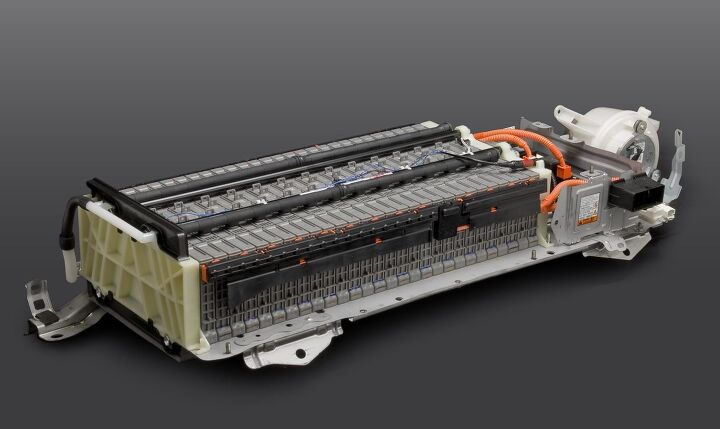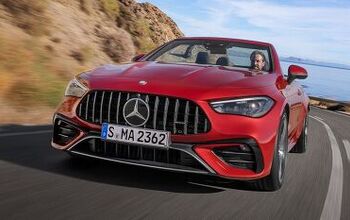Original Hybrid Batteries Still Charged Up 15 Years Later

Many industry reporters and enthusiasts attached stigma to early mass market hybrids because of the unknown reliability of their batteries. Potential owners worried that a failed battery would stick them with an expensive, out-of-warranty repair bill.
The first generation of hybrid vehicles hit the streets right around the turn of the century, right at the same time the domestic market was in love with SUVs. Anecdotes abounded about how dangerous and expensive hybrids would be to fix and maintain. Now that they’ve been on the road for over a decade, data shows — for the most part — there was no reason to fear these electrified fuel sippers.
The Toyota Prius and Honda Civic Hybrid were some of the first hybrids to hit the road and many are still running on their original batteries today. Those battery packs are made up of many individual Nickel Metal Hydride (NiMH) battery cells. As Alex Dykes explains here, NiMH battery chemistry is not extremely power dense, but it’s fairly stable. These cells are most likely to lose battery life if they are fully charged or discharged, so manufacturers came up with safeguards that force the batteries to only use 60 to 70 percent of their rated capacity. These safeguards have helped keep many of these batteries in usable condition for hundreds of thousands of miles.
Even with the safeguards in place, there are some that fail or lose capacity. Many of these systems have passive cooling, which relies on the air in the cabin to cool the battery pack. If the batteries are exposed to heat often, the cells may degrade resulting in a decrease of usable charge. Leaving these batteries sitting unused for longer periods of time can also be detrimental, as some can fully discharge and become unrecoverable from that state. Most manufacturers recommend running the cars at least every couple of months to maintain battery health.
Initial reports from automakers stated that most of these batteries were surviving well past the warranty period. Honda initially reported that battery failure rates outside of the warranty period were around 0.002 percent for all of its cars. Toyota stated that about 1 percent of first generation Prius batteries failed out of warranty. That failure rate dropped to around 0.003 percent for second-generation hybrids. Consumer Reports conducted owner surveys that counted all battery replacements and found that first and second year Prius models had around a 5-percent replacement rate, which dropped closer to 0.1 percent during the end of the run for the second-generation Prius.
Honda models did not fare as well in the survey with 21 percent of first year Civic Hybrids requiring a battery replacement at some point. The replacement rate dropped into the single digits by 2008, but quickly spiked to over 30 percent for 2009 and 2010 models. The main issue at play with Honda IMA batteries was the original programming did not work well in stop-and-go situations. Taking the car for short trips while the battery was low on charge would not allow it to ever fully charge up, which would shorten its usable state of charge and cause it to fail.
In response, Honda rolled out software updates that changed the logic for battery charging and reduced the amount of time that the battery would be in use when low on charge so that it would be able to get back to healthy state. It also issued warranty extensions, which can cover some vehicles for up to 11 years or 162,000 miles, to extend coverage of the IMA battery. Most of these models are still under the standard 8-year/100,000 warranty, so owners do not incur any costs for a battery replacement. My experience with a 2003 Civic Hybrid echoed some of these issues. I purchased the car after it had sat for some time and it showed various battery errors and an unequal state of charge. Luckily, I was able to build a grid charger and bring it back to life.
General Motors ran into issues with some of its earlier hybrid vehicle batteries.
In 2008, it first recalled about 9,000 battery packs for internal leaks that could disable the battery packs for some of its Chevy and Saturn models. This was followed by another recall in 2010 that saw GM replacing all battery packs for 2007 to 2010 hybrid vehicles due to risks of cracking that could cause external leaks. There has not been any word of widespread issues with the replacement packs and my personal experience with the Saturn Vue Hybrid has shown the replacement battery remains reliable, showing a factory state of charge on my basic OBDII tool as it approaches 100,000 miles.

More by Bozi Tatarevic
Latest Car Reviews
Read moreLatest Product Reviews
Read moreRecent Comments
- ToolGuy There was a time when in a place called America there were roads, and they were paved, and they were paved smoothly enough for a vehicle like this. Perhaps our next President will bring back that concept.
- ToolGuy I suppose I will listen before commenting. (TG, what a fair-minded dude!)
- ToolGuy "The technology is much more advanced to be better than a role model driver,”• Do any of you know what a "role model driver" is? No, I guess you wouldn't. 😉
- ToolGuy I might be Batman.
- Lou_BC Well, I'd be impressed if this was in a ZR2. LOL


































Comments
Join the conversation
It’s a funny little dilemma: letting Toyota make the first high-volume hybrid meant that we’d all associate hybrids with being terrible to drive – mostly because it was a Toyota. But it also meant that the first successful hybrid would be reliable and practical. Was that a good tradeoff for hybrids? Probably, but it made them more divisive than they ever needed to be.
I have been looking at hybrids lately as early versions are falling to cheap car prices 3000$. The Toyotas have few problems the Hondas as mentioned much more. I haven't looked at GM yet as I haven't seen one come for sale locally. I really like the escape hybrid and the battery seems well done but I keep reading reports of 4000$ brake module failure combined with past Ford experiences I just can't pull the trigger.